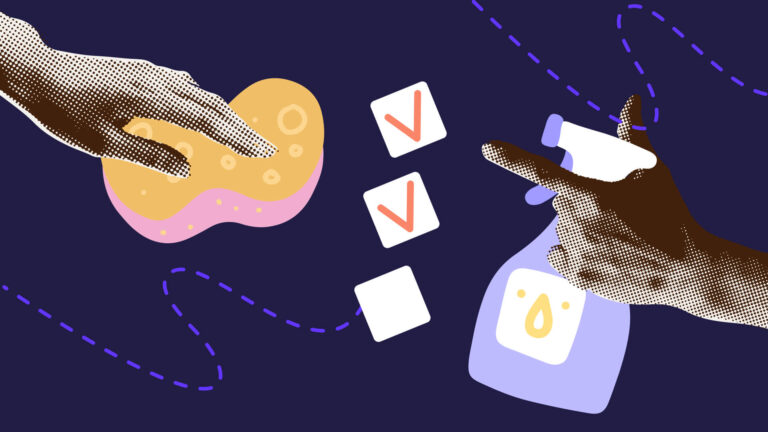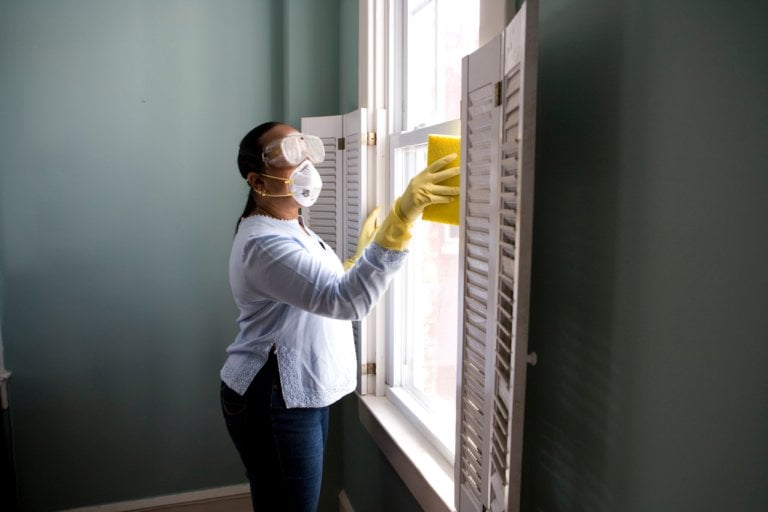We show you how to get the right insurance and bonds to protect your cleaning business against financial losses from accidents or theft.
Key Takeaways
- To get insurance for your cleaning business, you must assess your needs, compare providers, understand terms, apply for policies, await approval, and finalize your coverage.
- Insurance for cleaning businesses can cost anywhere from $100 to over $1,000 annually—depending on coverage types, business size, and risk factors.
- Adopting a business management tool like Connecteam can streamline your cleaning business operations and lower your risk profile.
Running a cleaning business comes with challenges, like defending your company, employees, and clients against inherent risks. These include on-the-job accidents or unexpected damages.
The right mix of insurance and bonds can be your safety net.
In this article, we discuss insurance types and bonds for cleaning businesses. We cover how to get insured and how much it costs.
Why Does Your Cleaning Business Need Insurance?
Insurance is essential for your cleaning business because it shields you from unexpected financial burdens that can arise during everyday operations. Here’s why:
- Accidents: If your employee accidentally spills bleach on a client’s expensive rug, liability insurance covers the cost of damage—so you don’t have to pay out of pocket.
- On-the-job injuries: If an employee slips and injures themselves while cleaning, workers’ compensation insurance helps cover their medical bills and lost wages.
- Theft or damage: If your cleaning equipment gets stolen or damaged, commercial property insurance helps replace it without damaging your finances.
- Legal requirements: Depending on your location, having certain types of insurance may be a legal requirement for operating your cleaning business.
- Client trust: Many clients, especially commercial ones, may require proof of insurance before signing contracts with your cleaning business.
📚 This Might Interest You:
Discover our guides on how to start a commercial cleaning business and how to get cleaning contracts.
The Difference Between Bonds and Insurance
Here’s how bonds and insurance differ:
- A bond involves 3 parties: your business, your client, and the bonding company. It guarantees clients that you’ll complete the contracted jobs as agreed. If the bonding company pays out a claim, you’re required to reimburse the company for the covered amount.
- Insurance is an agreement between your business and the insurance provider, covering financial losses from accidents, injuries, and unforeseen events. For instance, if your employees damage a client’s property, liability insurance covers the repair costs.
Types of Bonds and Insurance for Cleaning Businesses
Here are the types of bonds and insurance your cleaning business might need.
General liability insurance
Accidents happen, no matter how careful your team is. For instance, if a cleaner accidentally breaks a client’s window or a client trips over a vacuum cord and gets injured, general liability insurance can cover the costs.
General liability insurance covers property damage, injuries to those not employed by your business, and issues arising from advertising—such as defamation or copyright infringement. It protects your business from the financial implications of lawsuits and claims.
An important feature of this policy is the ability to add additional insureds, which can extend coverage to partners or clients—often without extra cost. This is particularly beneficial when working closely with clients who require additional protection under your policy.
Commercial property insurance
Your equipment and premises are vital to your operations. If a fire destroys your storage facility or thieves steal your high-end cleaning equipment, commercial property insurance helps you replace these essential assets. It covers losses from fire, theft, vandalism, and natural disasters.
Workers’ compensation insurance
Cleaning jobs can be physically demanding and expose workers to hazardous chemicals or environments. Workers’ compensation insurance benefits employees who suffer work-related injuries or illnesses. It covers medical care, rehabilitation, and a portion of lost wages during recovery periods.
It’s a legal requirement in many places and a key factor in maintaining a satisfied workforce.
Professional liability insurance
Also known as Errors and Omissions (E&O) insurance, professional liability insurance safeguards against claims of negligence, missed deadlines, or unsatisfactory work that didn’t meet contractual promises.
If a client claims your cleaning service didn’t meet agreed-upon standards and caused them financial loss, professional liability insurance can cover compensation claims and legal expenses.
Business owner’s policy (BOP)
Opting for a BOP can be more cost-effective than purchasing each insurance separately. This bundled package combines many types of coverage, such as general liability, property insurance, and sometimes business interruption insurance (which covers lost income when your business can’t operate for some reason, such as during a natural disaster). It’s tailored to meet the needs of small to medium-sized businesses.
Surety bonds
Surety bonds guarantee your clients that you’ll fulfill your contractual obligations. If you fail to do so, they can receive compensation.
Fidelity bonds (janitorial bonds)
Fidelity bonds protect your clients from losses due to dishonest acts by your employees—such as theft of valuable assets.
📚 This Might Interest You:
We have put together a number of checklists that can assist you in your daily business operations. You can find them, and many more, in our checklist & templates library.
Optional Insurance for Enhanced Protection
Depending on your specific needs and risks, these additional options could benefit your cleaning business:
- Commercial auto insurance: Covers vehicle damage and liability for businesses using vehicles. Essential for transporting equipment or employees.
- Umbrella insurance: Provides extra coverage beyond existing policy limits. Useful for significant claims that exceed primary policies.
- Pollution liability insurance: Covers environmental damage cleanup and related liabilities. Useful for businesses using harmful chemicals.
- Cyber liability insurance: Protects against data breaches and cyberattacks. Useful for businesses handling sensitive information or using digital systems.
How To Get Your Cleaning Business Bonded and Insured
Securing the right bonding and insurance for your cleaning business is crucial for protection and building client trust. Here’s how you can do this.
Step 1: Evaluate your needs
Begin by assessing the risks associated with your cleaning business to select the necessary insurance policies and bonds.
For instance, if your team specializes in high-end residential cleaning, you may need more comprehensive liability insurance to cover potential damage to expensive property. Likewise, if your cleaners enter homes or businesses where theft could be a concern, a fidelity bond becomes essential.
💡 Pro Tip:
Consult with a lawyer or insurance broker to determine the specific types of insurance and bonds your business needs. They can also help you understand complex insurance terms.
Step 2: Compare quotes and providers
Next, research and compare offerings from general insurers and bonding agencies—and those specializing in cleaning—to find the best coverage. You can look on their websites, use insurance comparison sites like NetQuote, contact insurance brokers, or look up customer reviews. Some popular insurance companies in the US are Acuity, Nationwide, Travelers, and The Hartford.
Specialized providers may deliver tailored policies suited to your needs, potentially eliminating the need for multiple providers.
For example, one insurer may offer a package deal that combines general liability and commercial property insurance at a rate that’s lower than the combined rates for separate purchases.
Don’t rush into choosing the first provider you find. Get quotes from several insurance and bonding companies. Look beyond the price.
Consider the coverage limits (the maximum amount the policy will pay), deductibles (what you’ll pay out of pocket before insurance kicks in), and exclusions (specific situations or damages the policy doesn’t cover). Also, consider the provider’s reputation for customer service and claim handling.
💡 Pro Tip:
Cleaning companies interested in surety bonds can use the Small Business Administration’s surety bond agency directory or the Bureau of the Fiscal Service’s list of certified companies to find providers.
Step 3: Understand terms
Carefully review each policy and bond’s terms. For instance, ensure that general liability insurance covers slips and falls, common hazards in cleaning jobs. Understanding the fine print can prevent surprises when making a claim.
Step 4: Apply for policies and await approval
To apply, contact insurers directly or use their online application systems. When filling out applications, provide detailed information about your operations to secure terms that best fit your business model. Misrepresenting your services or underestimating your coverage needs could lead to inadequate protection.
You must then wait for providers to assess your application based on the risks involved in your business, your past insurance history, and other factors. Be prepared for companies to offer higher premiums or specific exclusions or even decline your applications. If your application is declined, ask why, consider changes you might make to avoid future denials and reapply for insurance elsewhere.
💡 Pro Tip:
Consider using cleaning business software or janitorial management software to manage and document your team’s tasks and schedules. This can be especially helpful when applying for insurance and bonds, as it allows you to report your operational procedures and risk management practices accurately.
Step 5: Finalize and maintain your coverage
Once you’ve selected your policies and bonds, complete the necessary paperwork and make the initial payments. Paperwork will include your formal policy agreements—plus any other documents the provider requests.
Keep your documents organized for easy reference. An annual review of your coverage is important as your business grows. For example, expanding into commercial cleaning may require you to adjust your insurance to cover larger spaces and specialized equipment.
Moreover, ensure you obtain a certificate of insurance as proof of your coverage upon approval, which you can present to clients, landlords, or partners who require it.
💡 Pro Tip:
Be vigilant about renewal dates to avoid any lapses in coverage, ensuring continuous protection for your business.
How Much Does Cleaning Business Insurance Cost?
Several key factors influence the cost of both insurance and bonds for different types of cleaning businesses:
- Business size and scope: Larger businesses or those providing high-risk services may face higher premiums due to increased exposure to potential claims.
- Location: Operating in areas with higher crime rates or natural disaster risks can increase insurance costs.
- Claims history: A history of claims can indicate higher risk to insurers and bonding companies, leading to higher premiums.
- Coverage limits and deductibles: Higher coverage limits and lower deductibles can provide more protection but will increase your costs.
Based on the information from Insureon, here are the estimated costs for different types of insurance for cleaning services:
- General Liability Insurance: Costs about $580/year ($48/month).
- Workers’ Compensation Insurance: Averages $1627/year ($136/month).
- Business Owner Policy (BOP): Priced around $684/year ($57/month).
- Janitorial Bonds (Surety Bonds): Costs about $100-$150/year ($11/month).
- Commercial Umbrella Insurance: Averages $801/year ($67/month).
Disclaimer: These costs are median estimates and can vary based on several factors, including those factors mentioned above, the services you offer, and how many employees you have. You should obtain personalized insurance quotes from insurance companies for accurate pricing based on your specific needs and risk profile.
🧠 Did You Know?
Using a comprehensive management tool like Connecteam for your cleaning company could potentially reduce your insurance premiums by improving safety protocols and reducing the risk of accidents and claims.
Secure Your Future With Cleaning Business Insurance
Securing the right insurance and bonds for your cleaning business is essential for protecting your operations, building client trust, and ensuring financial stability.
While costs and requirements may vary, the peace of mind that comes with comprehensive coverage is invaluable.
Additionally, leveraging technology to optimize your business operations can help you manage risks more effectively. You can use a cleaning app like Connecteam to streamline your daily tasks and support your case for lower insurance and bond costs through improved risk management.
Try Connecteam for free today!
FAQs
What is the meaning of housekeeping insurance?
Housekeeping insurance refers to specialized coverage for businesses providing cleaning services. It protects against liabilities such as property damage, injuries, and theft, ensuring financial stability and trust between service providers and their clients. It typically includes general liability and workers’ compensation insurance—and may also feature bonding for employee theft.
Do you need insurance for cleaning businesses in Florida?
Yes. Florida cleaning businesses require insurance to operate legally and protect against risks. Mandatory coverage includes general liability—plus workers’ compensation insurance for businesses with employees. Additional policies like commercial auto insurance might be needed depending on business operations and assets.



